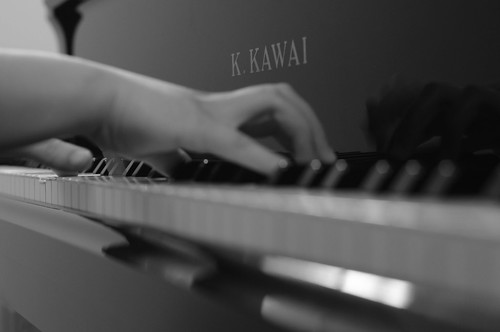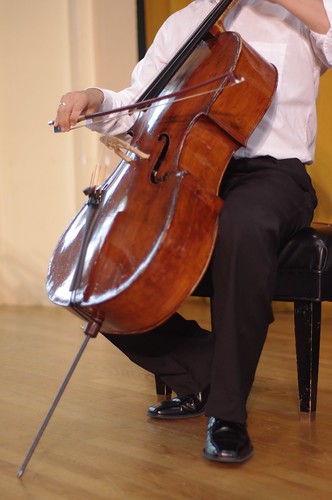
This is, obviously, a badly titled post. Because 'enjoy' is not the proper word. Not that there is anything wrong with merely enjoying something. I believe that there is a place in life for things that can be enjoyed as they are. But I don't think that 'enjoy' or 'appreciate' conveys how I experience concert music. There is a cliche that those with mathematical backgrounds should enjoy classical music because music, like math, deals with patterns. But that does not get you very far. By the end of chapter 2 of his Critical and Historical Essays (lectures on music at Columbia University), Edward MacDowell shows examples of what happens when you take mathematics as the means of analysis of music, and each historical case of cultures that try it leads to dead ends.
When I was in high school, the smart kids, the ones in the honors program, took Art Appreciation. I was not one of those kids. To this day, I say I know almost nothing about art/music history or theory. My experience with music was playing in the high school marching and symphonic bands. While I was good enough to be first chair my senior year, and being part of the Chicago All-Catholic Band, our ambitions were suitably limited (the bandmaster considered part of his job to be dissuading students from the profession.) The goal there was an appreciation of music, and perhaps a life-long hobby (e.g. community ensembles or playing in private). This is where I was when I lived around Washington DC, where I took advantage of a wealth of performances in public spaces (museums, parks, public buildings, university) and the occasional concert. And I continued my practice from when I was an undergraduate of going to performances of friends who were in music programs at the local universities.
In graduate school this began to transform. I had friends in the music program, but now I was at a school with a decent music program, where students there had aspirations of professional careers in classical music. I was going to recitals, concerts, and programs where my friends were performing on a regular basis. And, since I was taking my time in a Ph.D. program, I could follow them throughout their time in school, and I could watch how they developed both in performances and sitting in on practice time. (I had one friend comment that having me in the room while she was practicing was like a studio session. My wife thanks everyone for the training as she is the current beneficiary of all of those sessions.) Over time I stopped merely hearing the music to listening for the interpretation. Instead of appreciating the music being played, I could observe how an ensemble interact with each other and it became a conversation between people, not only the genius of the composer putting notes on a page.
What do I gain? Like all of the other fine arts, classical music is an abstract way of asking what it means to experience being human. At times composers use it to respond to a historical context. Most composers chose to create a tension by using a format to constrain themselves as they desired to emote or to present a story. (I tend to not get many of the more free form moderns). And I take it as a privilege to observe the result.
I am looking forward to another season of blogging for the Pittsburgh Symphony Orchestra. I have always maintained that my blog is not a concert review. The Post-Gazette has someone who does that as well as people associated with the schools of music and conservatories. Many with backgrounds in the humanities can discuss what a piece means. And I know little about the mechanics or history or philosophy of music. What I can do is pay attention to the concert and react to it. At a book discussion prior to last weeks opening gala, Renee Fleming stated that her performances where a collaboration between the creator (composer) and the performer. But she is missing an actor. Aaron Copeland stated that art is a collaboration between the composer, the interpreter, and the listener. Copeland tells the listener his job is to be aware of the personalities and functions of the composer and interpreter, to distinguish between them. And it is not sufficient (or maybe not even necessary) to be educated and trained, but the listener must love music. And not just particular styles or forms or schools of music, but across a wide range. And then react to it. Otherwise the efforts of composer and interpreter do not have meaning. I do my part.

No comments:
Post a Comment